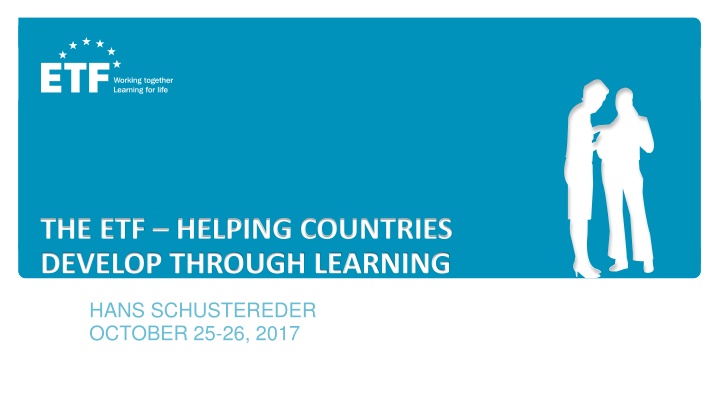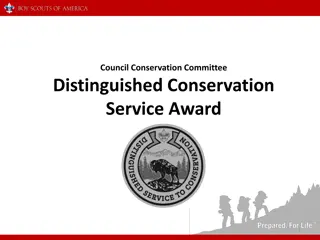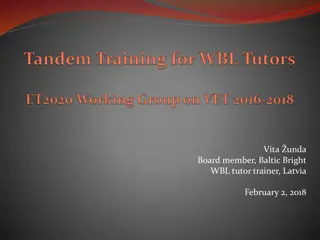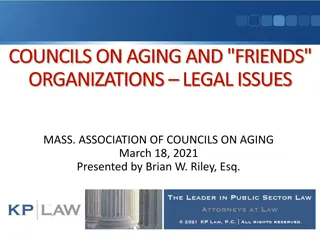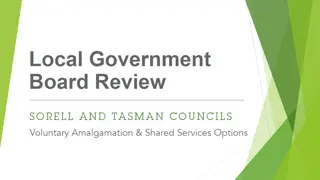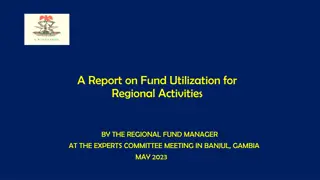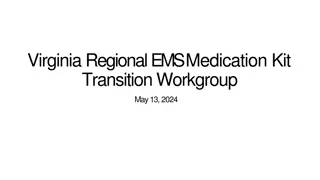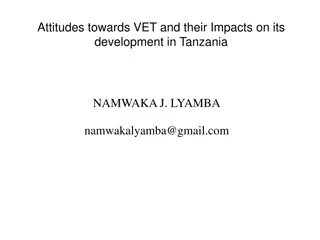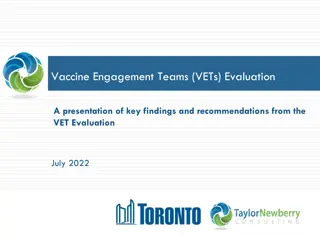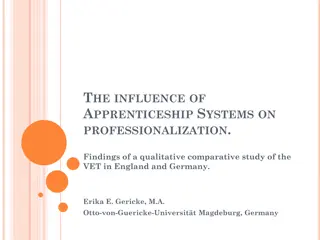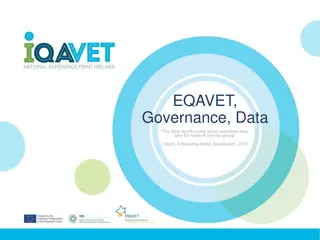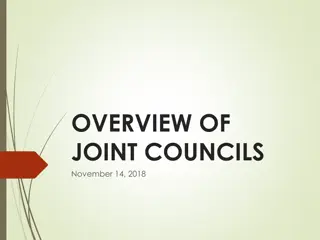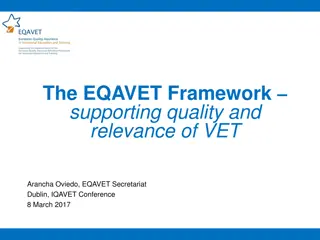Regional VET Councils Research on International Practices
The research delves into various aspects related to Regional VET Councils, covering topics such as regulatory provisions, membership composition, governance principles, and partnerships with the labor market. It highlights the role of Regional VET Councils in the decentralization process of the VET system and emphasizes the importance of coordination within the broader administrative structure. The findings underscore the significance of Regional VET Councils as a mechanism to enhance training outcomes and improve overall effectiveness in vocational education and training.
Download Presentation

Please find below an Image/Link to download the presentation.
The content on the website is provided AS IS for your information and personal use only. It may not be sold, licensed, or shared on other websites without obtaining consent from the author.If you encounter any issues during the download, it is possible that the publisher has removed the file from their server.
You are allowed to download the files provided on this website for personal or commercial use, subject to the condition that they are used lawfully. All files are the property of their respective owners.
The content on the website is provided AS IS for your information and personal use only. It may not be sold, licensed, or shared on other websites without obtaining consent from the author.
E N D
Presentation Transcript
THE ETF HELPING COUNTRIES DEVELOP THROUGH LEARNING HANS SCHUSTEREDER OCTOBER 25-26, 2017
REGIONAL VET COUNCILS RESEARCH ON INTERNATIONAL PRACTICES Cross-country findings of the research on international practices of Regional VET Councils 2
REGIONAL VET COUNCILS RESEARCH ON INTERNATIONAL PRACTICES The Regional VET Councils of four countries were studied: Kazakhstan France Italy Slovakia 3
REGIONAL VET COUNCILS RESEARCH ON INTERNATIONAL PRACTICES The research covers several aspects related to Regional VET Councils 1/2 Main regulatory provisions of Regional VET Councils; Nature, mission/mandate of regional VET Councils; Budget; The composition of Regional VET Councils; Members; Councelors and other types of members: Nomination, profile requirements, responsibilities and rights; Types of committees/commissions: Names, composition, functions, main activities; Secretariat. o o o o o o 4
REGIONAL VET COUNCILS RESEARCH ON INTERNATIONAL PRACTICES The research covers several aspects related to Regional VET Councils 2/2 Regional VET and labor market governance: Regional VET Council Partnerships; Good Governance of Regional VET Councils: Behavior principles and rules of procedure; Applying good governance principles: Transparency, accountability and anti-corruption policy; o Types and modes of delivering decisions; o Critical aspects and matters of concern. 5
REGIONAL VET COUNCILS RESEARCH ON INTERNATIONAL PRACTICES Main observations 1/5 The Regional VET Councils are the result of a decentralization process in the VET system. They are one of several means to achieve better training results. They are not and end in themselves. The Regional VET Council is one element in a horizontal and vertical structure. Its mandate is to be coordinated with the mandates of the other elements in this structure. Regional VET Councils are partly composed of members of other structures. They tend to be headed by the head of another administrative structure. This is likely to have implications for their functioning. 6
REGIONAL VET COUNCILS RESEARCH ON INTERNATIONAL PRACTICES Main observations 2/5 Regional VET Councils are made mandatory by a national law and established by a decree, while their functioning is regulated by internal rules and regulations. The latter are tailored to the specific needs of the region. Although Regional VET Councils have a variety of tasks requiring special skills, little to no attention is given to training and capacity building of their members. Deliberation and consultation are key functions of the Regional VET Councils. 7
REGIONAL VET COUNCILS RESEARCH ON INTERNATIONAL PRACTICES Main observations 3/5 The Regional VET Council tends to have no budget of its own, but uses the administrative and human resources of the organizations whose staff are among its members. National legislation includes little information about the nomination, profile requirements and responsibilities and rights of members of Regional VET Councils The efficiency of the work of the Regional VET Council depends on a number of factors. 8
REGIONAL VET COUNCILS RESEARCH ON INTERNATIONAL PRACTICES Main observations 4/5 A clear definition of the mandate of the Regional VET Council is a precondition for its effective performance. Little information is available about types and modes of delivering decisions. Little information is available about the cooperation between the Regional VET Council and other bodies, institutions and structures. However, cooperation does take place on an informal level. 9
REGIONAL VET COUNCILS RESEARCH ON INTERNATIONAL PRACTICES Main observations 5/5 Little information is available about the types of committees/commissions which are to support Regional VET Council and provide it with expert knowledge. Little information is available in relation to the good governance of Regional VET Councils, although transparency, accountability and anti-corruption are important aspects of their work. Little information is available about the evaluation of the work of the Regional VET Council. 10
REGIONAL VET COUNCILS RESEARCH ON INTERNATIONAL PRACTICES Potential outcomes of the work of Regional VET Councils 1/2 Outcomes result from the functions of the Regional VET Council Diagnostic and analytical function; Advisory and consultative function; Executive function. 11
REGIONAL VET COUNCILS RESEARCH ON INTERNATIONAL PRACTICES Potential outcomes of the work of RVC 2/ Diagnostic and analytical function Advisory and consultative function Executive function Evaluation of VET and employment policies; Opinion on developments in VET and employment policies; Opinion on quality standards; Needs analysis; Forecasts of skills demands; Analysis of skills demands. Recommendations for National Council; Proposals for regional VET studies; Recommendations on the opening or closing of VET institutions; Advise on the supply of qualified personnel; Advise on coherence of VET programs. Cooperation between social partners; Implementation of decentralization process; Lifelong Learning activities; Assistance in training of in-company trainers; Contribution to occupational standards; Contribution to training programs and plans; Contribution to a coordinated VET policy; Contribution to a regulatory framework. 12
REGIONAL VET COUNCILS RESEARCH ON INTERNATIONAL PRACTICES Thank you for your attention! 13
